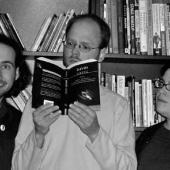Reading for awesomeness
Since we began producing in 2004, we’ve discovered that there’s no single consistent answer to the question of how we plan our seasons. The simplest answer is that we stage the sort of shows that we'd want to see, and our personal tastes tend to guide us towards new works and regional premieres. We also consciously choose works that provide us with a compelling challenge, that we believe will be fun for our designers, our actors, our audience, and ourselves.
We read and read and read plays. We’re constantly researching what’s happening in theaters in Minnesota and elsewhere, both to find new plays and to build a context of what’s being done locally, nationally, and internationally. We haunt theater bookstores and playwright organizations. We contact playwrights and solicit their scripts. We see who represents a given author and look at who else they represent. We ask friends around the country to see plays on our behalf, and we see plays wherever we travel. When we find scripts that we enjoy, but aren’t quite right, we see what other plays the author has written, what other plays the original producer has staged, and what other scripts their publisher has published. We read reviews and subscribe to new play journals and magazines. And of course we get recommendations, pitches, and submissions. But mostly we simply read and see a lot of plays. We see at least 80 shows a year and read at least 100 more. And we miss even more. Sometimes, John, for example, will read four plays a day for four days straight; other times — we simply have to ditch out and play Rock Band with friends.
As Co-Artistic Directors, the three of us share the work of season planning. When one of us finds a compelling script, the reader passes it on to another company member, often without explanation. “Here, read this.” We’re all busy enough that we don’t recommend scripts to each other without cause, but we try not to give much insight about why a script stood out – for fear of prejudicing their initial read. If the script resonates with the second reader, it should be reasonably clear why it was suggested, and it gets passed on to the third company member. If it doesn’t immediately resonate, we talk about what does and doesn’t recommend it for production, after which it may still be passed along to the third company member – especially if one of us feels truly passionate about it.
After a script has been read by all three of us, we talk about it extensively. While there’s a tremendous amount of overlap in our tastes, we each have our personal preferences: John likes compelling and quirky narrative structures; David likes difficult questions asked in fun ways; and Amy likes complicated emotional journeys that allow for interesting staging. Hence, Walking Shadow plays usually possess these elements, as well as, frequently, a sense of moral ambiguity – the feeling that the world is what we make of it.
Beyond that, some of the basic qualities we look for are: Intelligence, i.e. is it well-constructed? Does it posit interesting ideas? And Sexiness – is there something mysterious and alluring about it? What feelings does it evoke? Awesomeness – does it give wonder? Does it demand to be a live experience? Cleverness – is it theatrically aware, well-paced, humorous, fun? Honesty – does it ring true? Or does it have a compelling reason to ring false? Challenge – will it give us something to strive towards? Does it ask difficult questions?
Naturally, there are pragmatic concerns as well – how difficult or expensive it is to obtain the rights, how large or small a production has to be, what casting or design specifics it requires, and what venues are available – although these factors are rarely part of our initial discussion.
We believe that any play worth seeing must have a compelling reason to be staged that transcends the effect of simply reading it. The American Pilot, for example, had an ending that could not be fully conveyed on the page. The characters spend the entire play discovering their shared humanity, until a brief misunderstanding causes a horrifying conclusion. In the script, there are just clinical stage directions about a gunfight, but in performance the emotional content of the scene slaps the audience in the face unexpectedly, leaving them wishing hard that things had worked out differently. The Cryptogram, 36 Views, and Seventy Scenes of Halloween demanded to be staged, as they required the intricate subtleties of actors’ performances to make sense of their quirks and leaps of logic. And some of our plays have required a significant imaginative leap in staging: Mr. Marmalade takes place in the mind of a troubled 4 year old girl played by a 20-something-year-old woman, while Amazons and Their Men was ostensibly a string of discarded film clips and was written in the language of Leni Riefenstahl’s cinematic style.
Sometimes we stage shows for the sheer thrill of creating an unusual experience. In 1926 Pleasant, the audience solved puzzles in an unfinished condo to move the story, loosely based on Japanese ghost films, forward. This play came about because we dared ourselves, “Could we do a show with puzzles? What would that mean?” Shakespeare’s Land of the Dead was meant to woo the audience with the meta-theatrical concept behind it, while inspiring awe at the spectacle of staging such a large-scale show in the Fringe Festival.
Many scripts are interesting enough to be read by all of us without ever making it into one of our seasons – these plays enter a low orbit around our discussions, and are used as conversational touchstones – but the scripts that really succeed are those that one of us feels passionately about: a script that haunts us long after reading it, that keeps coming up in conversation. If a script really resonates strongly we’ll hold onto it until we’re ready to stage it (and cross our fingers that no one else produces it first!)
Though people have occasionally commented on the cohesive artistic vision of Walking Shadow, we’re simply guided by personal taste. Above all else, we look for material that will be satisfying enough for us to pour in all the time, energy and love that staging a show requires. The scripts that we produce conform to one standard above all others: they’re the kind of shows that we would be excited to see.❦




